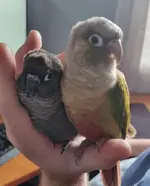We've currently got three birds.
We got Allen roughly a year and a half ago from a pet shop. We were told at the time it was a male conure and was hand-reared. After a few eggs, we discovered that one part of this was blatantly wrong, and we suspect the other is rubbish too.
Allen is very skittish, and at times quite aggressive. We've been working with her the same as the other birds since we brought her home, but while she has shown a small improvement, she is still hard to handle as she bites very hard, almost always drawing blood, and often without any apparent reason. And while she's in egg-laying mode everything gets amped up a few notches making her almost impossible to handle. She also bullies Poe quite a bit, but this particular behavior kind of comes and goes.
We honestly never intended to have a female bird, and while we've tried to take the egg-laying in stride, the increased aggression is making things difficult. We're starting to consider finding her a new home, but there are a few factors that are holding us back from this option.
Edgar has bonded with Allen by this point. They regularly cuddle up together, preen each other, share a cage, and when Allen starts her egg-laying, Edgar also shows some increased aggression (Although still far less than Allen) and has drastically less interest in being around us and largely goes wherever Allen goes. We're fairly confident we can find Allen a good quality home, but we're also concerned about the effect her absence might have on Edgar.
Re-homing is not an option I like, but at this point, I'm not sure what to do with her. She's effectively like a wild bird in the house with barely concealed intolerance of everyone but Edgar.
In terms of their environment - They sleep in cages at night (Poe in one, and Edgar/Allen sharing another). During the day they all share the same space - I converted my small balcony into an aviary so they have plenty of space to fly about. They get the average enrichment toys like foraging trays for their seed/pellets and a baffle cage with treats. they also get fresh veggies every morning. They spend time in the house with me every morning before I leave for work and a few hours every afternoon when I get home.
I'm here seeking advice and I'm open to all suggestions. I'm not sure what is relevant to this sort of discussion, so I'm happy to answer any questions about behaviors, environment, or anything else that may be relevant that I haven't covered here. I've attached a picture of Edgar (Left) and Allen (Right). Edgar regularly cuddles up into my hand like this. This picture is from one of the exceedingly rare times Alan joined him.
- Edgar - Green Cheek Conure
- Allen - Green Cheek Conure (Pineapple if that matters)
- Poe - Indian Ringneck
We got Allen roughly a year and a half ago from a pet shop. We were told at the time it was a male conure and was hand-reared. After a few eggs, we discovered that one part of this was blatantly wrong, and we suspect the other is rubbish too.
Allen is very skittish, and at times quite aggressive. We've been working with her the same as the other birds since we brought her home, but while she has shown a small improvement, she is still hard to handle as she bites very hard, almost always drawing blood, and often without any apparent reason. And while she's in egg-laying mode everything gets amped up a few notches making her almost impossible to handle. She also bullies Poe quite a bit, but this particular behavior kind of comes and goes.
We honestly never intended to have a female bird, and while we've tried to take the egg-laying in stride, the increased aggression is making things difficult. We're starting to consider finding her a new home, but there are a few factors that are holding us back from this option.
Edgar has bonded with Allen by this point. They regularly cuddle up together, preen each other, share a cage, and when Allen starts her egg-laying, Edgar also shows some increased aggression (Although still far less than Allen) and has drastically less interest in being around us and largely goes wherever Allen goes. We're fairly confident we can find Allen a good quality home, but we're also concerned about the effect her absence might have on Edgar.
Re-homing is not an option I like, but at this point, I'm not sure what to do with her. She's effectively like a wild bird in the house with barely concealed intolerance of everyone but Edgar.
In terms of their environment - They sleep in cages at night (Poe in one, and Edgar/Allen sharing another). During the day they all share the same space - I converted my small balcony into an aviary so they have plenty of space to fly about. They get the average enrichment toys like foraging trays for their seed/pellets and a baffle cage with treats. they also get fresh veggies every morning. They spend time in the house with me every morning before I leave for work and a few hours every afternoon when I get home.
I'm here seeking advice and I'm open to all suggestions. I'm not sure what is relevant to this sort of discussion, so I'm happy to answer any questions about behaviors, environment, or anything else that may be relevant that I haven't covered here. I've attached a picture of Edgar (Left) and Allen (Right). Edgar regularly cuddles up into my hand like this. This picture is from one of the exceedingly rare times Alan joined him.

